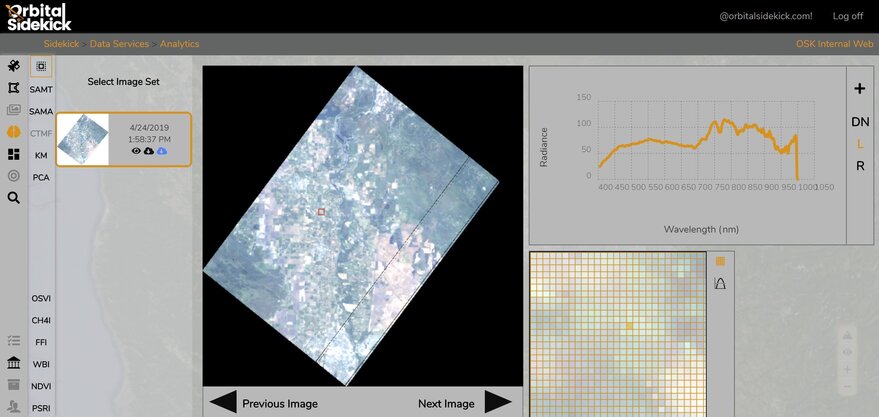AN FRANCISCO – Hyperspectral satellite startup Orbital Sidekick (OSK) announced a contract Nov. 19 to work with an industry-led consortium to develop tools for daily monitoring of oil and gas pipelines.
“This is an important validation of our commercial application and viability,” Dan Katz, OSK CEO and co-founder, told SpaceNews. “We are not merely a satellite imaging company that sells data to the government. We provide full turnkey monitoring services to the energy sector.”
Under the contract awarded by Intelligent Pipeline Integrity Program (iPIPE), an industry-led consortium managed by the University of North Dakota’s Energy and Environmental Research Center and focused on applying technology to prevent and detect pipeline leaks, OSK will gather satellite and aerial observations over the Bakken and Permian basins to demonstrate the value of space-based hyperspectral pipeline monitoring.
“OSK will both perform development work and deliver fully analyzed reporting on designated client areas of interest,” Katz said by email. “The OSK project with iPIPE will support scaling of our analytical capabilities while also providing critical market input into the refinement of our reporting design and features.”
Many Earth observation companies see infrastructure monitoring as an important application for their technologies. Pipeline monitoring, specifically, is often cited in business plans because energy companies pay for aircraft imagery to detect leaks.
“There are many applications that we see as incredibly important, and energy infrastructure monitoring is one where we know we can make an immediate and critical impact,” Katz said. “As we continue to establish ourselves as a scalable, reliable solution in this initial market, we can begin to tackle other areas within energy, such as new energy exploration and sustainability.”
OSK began demonstrating its first hyperspectral sensor on the International Space Station in 2018. The company is preparing to launch its second hyperspectral sensor in December on a Loft Orbital satellite and the firm has Air Force backing to expand its constellation.
By the conclusion of the iPIPE project in late 2021, OSK intends to offer a commercial service to help prevent and detect pipeline leaks. That service will be driven both by hyperspectral imagery and change detection algorithms.
“Once we deploy our full hyperspectral satellite constellation over the next 18 months, we will be able to offer a daily monitoring capability,” Katz said. “High-temporal resolution combined with precise spectral data is the engine for our change detection architecture and, ultimately, a reliable and scalable end-user product. OSK will conduct pipeline monitoring for its clients through a three-phased approach including direct data collection by satellite, analysis and finally timely reporting of actionable anomalies to the client.”
